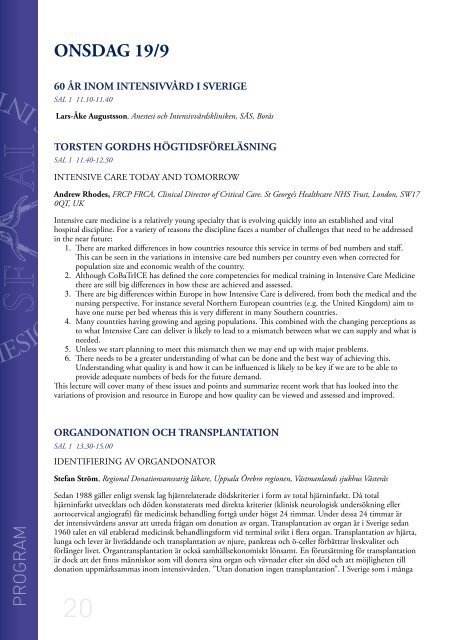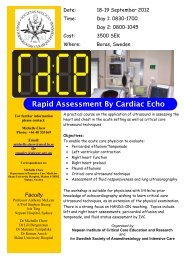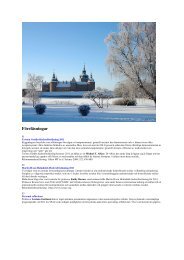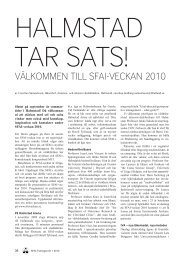Ladda ner den kompletta programboken här! - SFAI-veckan 2013
Ladda ner den kompletta programboken här! - SFAI-veckan 2013
Ladda ner den kompletta programboken här! - SFAI-veckan 2013
Create successful ePaper yourself
Turn your PDF publications into a flip-book with our unique Google optimized e-Paper software.
ONSDAG 19/9<br />
60 ÅR INOM INTENSIVVÅRD I SVERIGE<br />
SAL 1 11.10-11.40<br />
Lars-Åke Augustsson, Anestesi och Intensivvårdskliniken, SÄS, Borås<br />
TORSTEN GORDHS HÖGTIDSFÖRELÄSNING<br />
SAL 1 11.40-12.30<br />
INTENSIVE CARE TODAY AND TOMORROW<br />
Andrew Rhodes, FRCP FRCA, Clinical Director of Critical Care. St George’s Healthcare NHS Trust, London, SW17<br />
0QT, UK<br />
Intensive care medicine is a relatively young specialty that is evolving quickly into an established and vital<br />
hospital discipline. For a variety of reasons the discipline faces a number of challenges that need to be addressed<br />
in the near future:<br />
1. There are marked differences in how countries resource this service in terms of bed numbers and staff.<br />
This can be seen in the variations in intensive care bed numbers per country even when corrected for<br />
population size and economic wealth of the country.<br />
2. Although CoBaTrICE has defined the core competencies for medical training in Intensive Care Medicine<br />
there are still big differences in how these are achieved and assessed.<br />
3. There are big differences within Europe in how Intensive Care is delivered, from both the medical and the<br />
nursing perspective. For instance several Northern European countries (e.g. the United Kingdom) aim to<br />
have one nurse per bed whereas this is very different in many Southern countries.<br />
4. Many countries having growing and ageing populations. This combined with the changing perceptions as<br />
to what Intensive Care can deliver is likely to lead to a mismatch between what we can supply and what is<br />
needed.<br />
5. Unless we start planning to meet this mismatch then we may end up with major problems.<br />
6. There needs to be a greater understanding of what can be done and the best way of achieving this.<br />
Understanding what quality is and how it can be influenced is likely to be key if we are to be able to<br />
provide adequate numbers of beds for the future demand.<br />
This lecture will cover many of these issues and points and summarize recent work that has looked into the<br />
variations of provision and resource in Europe and how quality can be viewed and assessed and improved.<br />
ORGANDONATION OCH TRANSPLANTATION<br />
SAL 1 13.30-15.00<br />
IDENTIFIERING AV ORGANDONATOR<br />
Stefan Ström, Regional Donationsansvarig läkare, Uppsala Örebro regionen, Västmanlands sjukhus Västerås<br />
PROGRAM<br />
Sedan 1988 gäller enligt svensk lag hjärnrelaterade dödskriterier i form av total hjärninfarkt. Då total<br />
hjärninfarkt utvecklats och dö<strong>den</strong> konstaterats med direkta kriterier (klinisk neurologisk undersökning eller<br />
aortocervical angiografi) får medicinsk behandling fortgå under högst 24 timmar. Under dessa 24 timmar är<br />
det intensivvår<strong>den</strong>s ansvar att utreda frågan om donation av organ. Transplantation av organ är i Sverige sedan<br />
1960 talet en väl etablerad medicinsk behandlingsform vid terminal svikt i flera organ. Transplantation av hjärta,<br />
lunga och lever är livräddande och transplantation av njure, pankreas och ö-celler förbättrar livskvalitet och<br />
förlänger livet. Organtransplantation är också samhällsekonomiskt lönsamt. En förutsättning för transplantation<br />
är dock att det finns människor som vill do<strong>ner</strong>a sina organ och vävnader efter sin död och att möjligheten till<br />
donation uppmärksammas inom intensivvår<strong>den</strong>. ”Utan donation ingen transplantation”. I Sverige som i många<br />
20





